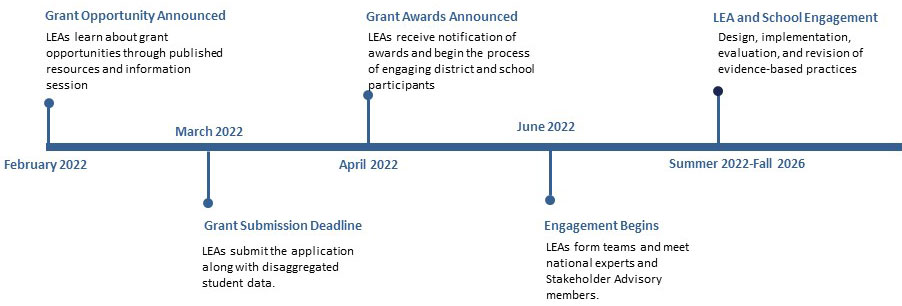Building Capacity to Provide Specially Designed Math Instruction and Embedded Social-Emotional Supports to Improve Outcomes for Elementary Learners with Disabilities
Maryland is investing $5.5 million in federal grant funds to support Local Education Agencies (LEAs) in the design and implementation of evidence-based mathematics instruction and social-emotional supports to narrow opportunity and achievement gaps for learners with disabilities. The Maryland State Personnel Development Grant (SPDG) will partner with national and State experts in specially designed mathematics instruction, social-emotional supports, and professional learning/coaching strategies to support a school-wide model to build the capacity of educators to collaborate and deliver evidence-based practices. Participating LEAs will be partners in the design of replicable practices that will serve as a model for replication across Maryland and have an opportunity to share their voices and contribute to a national collaborative math instructional model. Two of Maryland’s LEAs will be selected as leaders in the development of doable and replicable instructional practices within a school-wide approach to improve mathematics performance and social-emotional competence for ALL learners within two elementary schools, with a focus on narrowing the gap for students with disabilities.
State Responsibilities
Professional learning opportunities from national experts.
A well-defined evidence-based approach to mathematics specially designed instruction with embedded social-emotional supports, with fidelity measures.
An evidence-based coaching model, designed with local, State, and national input.
Funding for a district coach and stipends for school-based educators to learn and plan for instructional delivery; travel, as needed to attend professional learning Technical assistance and structures to facilitate the District Implementation Team and School Implementation Teams.
District (LEA) Responsibilities
A District Implementation Team committed to meet monthly with SPDG Facilitation and MSDE representation.
Schools include students with disabilities in general education mathematics instruction.
Evidence-based elementary mathematics curriculum.
Evidence-based mathematics screener and progress monitor for assessing student performance, with a system that provides disaggregated performance data reports.
District personnel time and capacity to provide professional learning and job-embedded coaching for the general and special education teachers of mathematics.
Individual student data through a data sharing agreement for the participating schools.
School Responsibilities
The proposed schools have a diverse population with 10-20% students with disabilities, AND a minimum of 25% of the total student population eligible for free and reduced meals.
A School Implementation Team, composed of general and special educators meets monthly with SPDG staff and District Coach to review school-wide implementation data, oversee implementation planning, and develop teacher support strategies as needed.
The school has a history of collaboration to adapt mathematics instruction for learners with disabilities, including those with significant cognitive disabilities.
Willingness to implement embedded evidence-based social-emotional learning (SEL) strategies within mathematics instruction.
Special and General Educators have (or will have) collaborative time to learn, plan, and implement new practices.
Grant Timeline

Thank you to the Local Education Agencies who applied. The application is now closed.
Contact Information
Please get in touch with Antoine L. Hickman, Assistant State Superintendent of the Division of Special Education, at antoine.hickman@maryland.gov with any questions or for additional information.